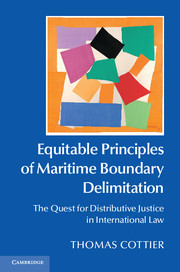 Equitable Principles of Maritime Boundary Delimitation
Equitable Principles of Maritime Boundary Delimitation Book contents
- Frontmatter
- Dedication
- Contents
- List of tables
- List of maps
- Preface
- Acknowledgements
- Table of cases
- Table of treaties and instruments
- Equity revisited: an introduction
- PART I Context: the enclosure of the seas
- PART II The new boundaries
- PART III Delimitation based on equity
- 8 The rule of equity
- 9 Conceptual issues and the context of equity
- 10 Justiciable standards of equity
- 11 The methodology of judicial boundary delimitation
- 12 The role of equity in negotiations
- Appendix I Maritime boundary agreements 1942–1992
- Appendix II General maps
- Bibliography
- Index
9 - Conceptual issues and the context of equity
from PART III - Delimitation based on equity
Published online by Cambridge University Press: 05 May 2015
- Frontmatter
- Dedication
- Contents
- List of tables
- List of maps
- Preface
- Acknowledgements
- Table of cases
- Table of treaties and instruments
- Equity revisited: an introduction
- PART I Context: the enclosure of the seas
- PART II The new boundaries
- PART III Delimitation based on equity
- 8 The rule of equity
- 9 Conceptual issues and the context of equity
- 10 Justiciable standards of equity
- 11 The methodology of judicial boundary delimitation
- 12 The role of equity in negotiations
- Appendix I Maritime boundary agreements 1942–1992
- Appendix II General maps
- Bibliography
- Index
Summary
The conceptual task
A. The quest for equitable standards
The fundamental rule of delimitation, essentially based on equity, is a legal concept. It is meant to provide an approach to maritime boundary delimitation in general public international law that is different from delimitation ex aequo et bono. Chapter 8 demonstrates that it is a rule of judge-made law which was eventually incorporated into the positive law of the Convention on the Law of the Sea. The courts have emphasized the legal quality being the essence of delimitation by equity in the present context of maritime boundary delimitation. Yet, the fundamental rule merely offers a starting point. Inherently, the substance of it – delimitation in accordance with equitable principles taking into account all relevant circumstances in order to achieve an equitable result – has to be defined and shaped in more concrete terms in order to qualify as a legally operational concept. In turn, equitable standards (encompassing equitable principles, circumstances, criteria and factors) need to be defined. The mutual relationship of such standards needs clarification. A proper methodology has to be developed in order to apply such standards under the facts of each particular case.
Indeed, the long-term viability and efficiency of the still fragile, judge-made rule of equity fully depends, as a legal concept, upon whether it brings about a number of defined and settled normative and operational standards capable of reducing overly broad discretion and subjectivism to an optimal degree, whatever their form, terminology and normative levels. Comparable to the evolution of equity in English law, the fundamental rule needs to develop into operational standards. Likewise, in international maritime boundary law, it has to achieve a stage of maturity where it effectively provides guidance in diplomatic negotiations and shows qualities of increased predictability in judicial settlements. A discussion of the evolution and sources of the zones and the fundamental rule shows that the law of delimitation cannot merely rely upon broad notions of justice, fairness and good faith.
- Type
- Chapter
- Information
- Equitable Principles of Maritime Boundary DelimitationThe Quest for Distributive Justice in International Law, pp. 440 - 514Publisher: Cambridge University PressPrint publication year: 2015


